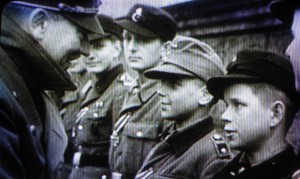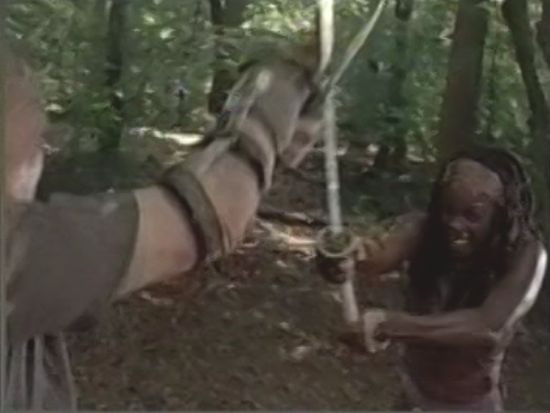 Last night’s episode of The Walking Dead titled “I Ain’t a Judas,” continued its incorporation of ethical themes for those interested in finding them and exploring their meanings. It surfaced in two ways in this episode, and both with reference to ethical considerations surrounding (believe it or not) Nazi Germany.
Last night’s episode of The Walking Dead titled “I Ain’t a Judas,” continued its incorporation of ethical themes for those interested in finding them and exploring their meanings. It surfaced in two ways in this episode, and both with reference to ethical considerations surrounding (believe it or not) Nazi Germany.
In the first instance we find The Governor in a state of weakening psychological and physical health. For several episodes now the viewer has become aware that the character is unhinged, and takes joy in the totalitarian oppression and abuse of others. This psychosis has been made worse with the (second) death of his zombified daughter at the hands of Michonne, and his increasing feelings of paranoia about who can be trusted in his own group, as well as fears about the possibilities of another attack by Rick’s group at the prison. In addition to this psychological state The Governor is still suffering from the effects of the loss of an eye at the hands of Michonne. Each of these elements come together to form a terrifying leader, yet one who also has the ability to control others who seem all too willing to fall under his spell.
In “I Ain’t a Judas” we see The Governor preparing those in Woodbury for an attack on Rick’s community at the prison, and almost everyone is pressed into service. In one scene The Governor reviews his new recruits, which include the very young, in the form of a boy with asthma , as well as the very old, in the form of a woman with arthritis. This scene is reminiscent of World War II archival footage of Adolf Hitler in the waning days of the war as he too functioned as an ailing and increasingly paranoid leader, reviewing young boys and old men as the last vestiges of what could be mustered as additional troops to counter the advances of the Allies. The parallels between the real-life and fictional totalitarian leaders are striking.
In the second instance Nazi Germany is specifically referenced. Merle has now become a reluctant member of Rick’s group. His past is checkered in many ways with the group members, having kidnapped, beaten, tortured, and almost executed several of them. Now that he must find a way to survive within this group, Merle must address his past actions. In this episode the process began with Michonne. As she was exercising he approached her and said that everything he did to her, including hunting her down at The Governor’s orders and trying to kill her, was “just business,” and that he was following orders. Michonne’s response is, “Just like the Nazis.” This brief line of dialogue takes us back in history to the same argument used by Nazi’s after the war during war crimes trials. The claim was that they shouldn’t be found guilty because they were simply following the orders of inhuman superiors who were in positions of authority and who could have had them killed for disobedience.
In the 1930s and 1940s the context was the breakdown of society and cultural norms through the horror of war. In The Walking Dead the context is the horror of a zombie apocalypse with the same societal breakdowns. The pressing question is whether an individual has an ethical and moral responsibility to not engage in such atrocities regardless of the social context, or whether the context somehow justifies such acts or at least makes them permissible. I appreciate the occasional ethical, social, cultural, and religious nuggets that this series incorporates. It provides depth for those of us interested in more than zombie mayhem.






There are no responses yet